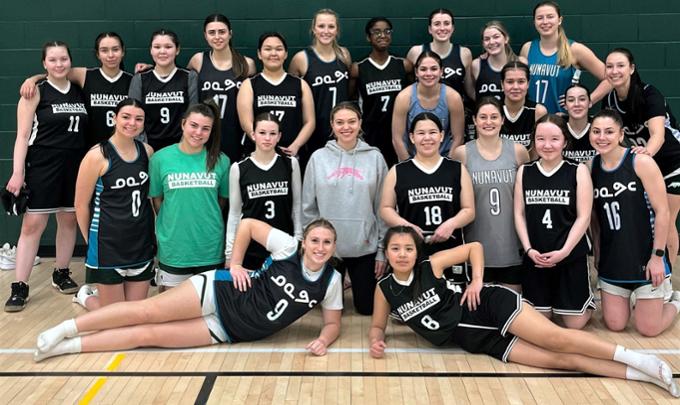Imagine the logistics of pulling together two Nunavut basketball teams to compete in the Mat-Su 2024 Arctic Winter Games in Alaska when your communities – Cambridge Bay, Bakers Lake, and Iqaluit City – are thousands of kilometers apart.
Enter the University of Regina Cougars women’s basketball team.
This past summer, three members of the U of R Cougars women’s basketball team – Jade Belmore (wing), Ryenn Schutz (forward), and Cara Misskey (guard) - travelled to Iqaluit, Nunavut for experiential learning opportunities. As part of their visit, the Cougars taught basketball skills in school gym classes and ran a weekend basketball clinic, organized by the Nunavut Basketball Association (NUBA). The NUBA, with the assistance of Dave Taylor, Head Coach of the U of R women's basketball team, aims to establish a long-term relationship with the U of R that strengthens women's leadership in sports and generates opportunities for Nunavut students.
I have realized that basketball is far more than just a game. Basketball brings people together, it brings joy and love, and it has the ability to empower and uplift anyone who is willing to put in the work.”— Cara Misskey, U of R Cougars & 4th-year Kinesiology student.
In February, the two teams from Nunavut travelled to the U of R for a second round of intensive week-long training with the Cougars women’s basketball team in preparation for the 2024 Arctic Winter Games happening from March 10 to 16 in Mat-Su, Alaska.
The Arctic Winter Games are a biennial multi-sport and cultural event held over one week, specifically focusing on circumpolar communities from areas like Canada, Alaska, Kalaallit Nunaat, and Northern Scandinavia. Representing Team Nunavut, 12 girls and 12 boys between the ages of 13 and 19 were selected from different territories to come together to play basketball for the first time as a team.
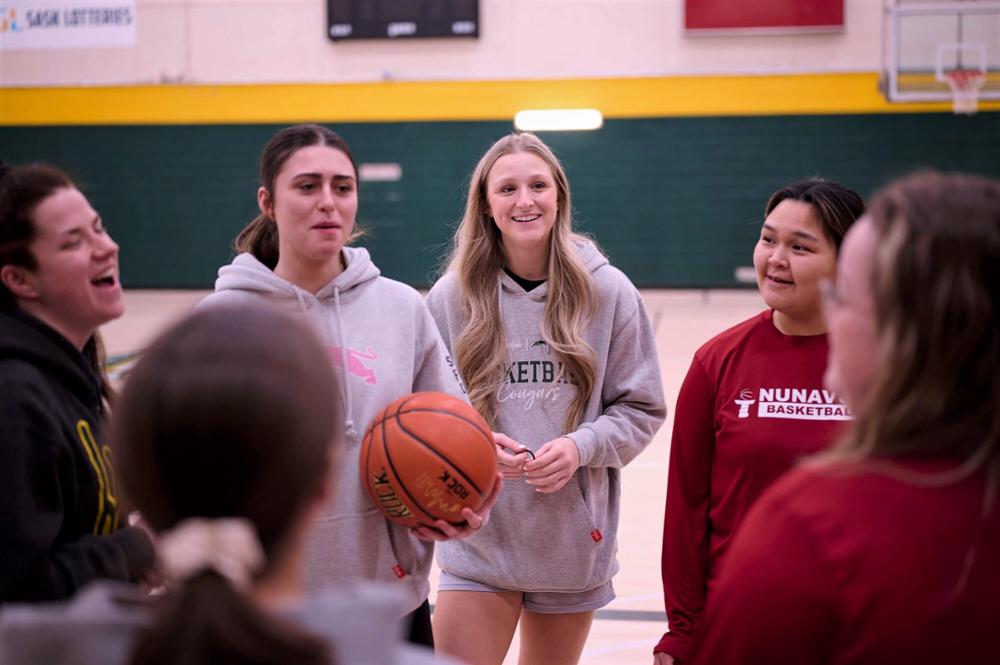
Let the training begin
With only a week to train, the Cougars got right down to business. They led warm-ups, shooting drills to work on form and speed, ball handling, breaking and implementing a press, and even demonstrating plays. After training, the Cougars held a Q&A discussion to give Team Nunavut advice on being nervous, training, and working as a team.
"The kids we worked with in Iqaluit last summer were amazing,” says Misskey. “They were dedicated, hardworking, and they absorbed everything we taught them. It was an extraordinary experience to share my years of basketball knowledge with such great kids."
Misskey is a fourth-year Kinesiology student who is majoring in Therapeutic Recreation. For someone who’s been playing basketball since she was six years old, it's been an impactful experience for Misskey to share the sport she loves with these students.
“It was great to see so many familiar faces from Team Nunavut when they arrived in Regina late last month. To re-establish that connection and to see how they have progressed up until now was remarkable,” shares Belmore, a fourth-year Kinesiology student majoring in Human Kinetics, who was named a first-team All-Canadian by U SPORTS earlier this month.
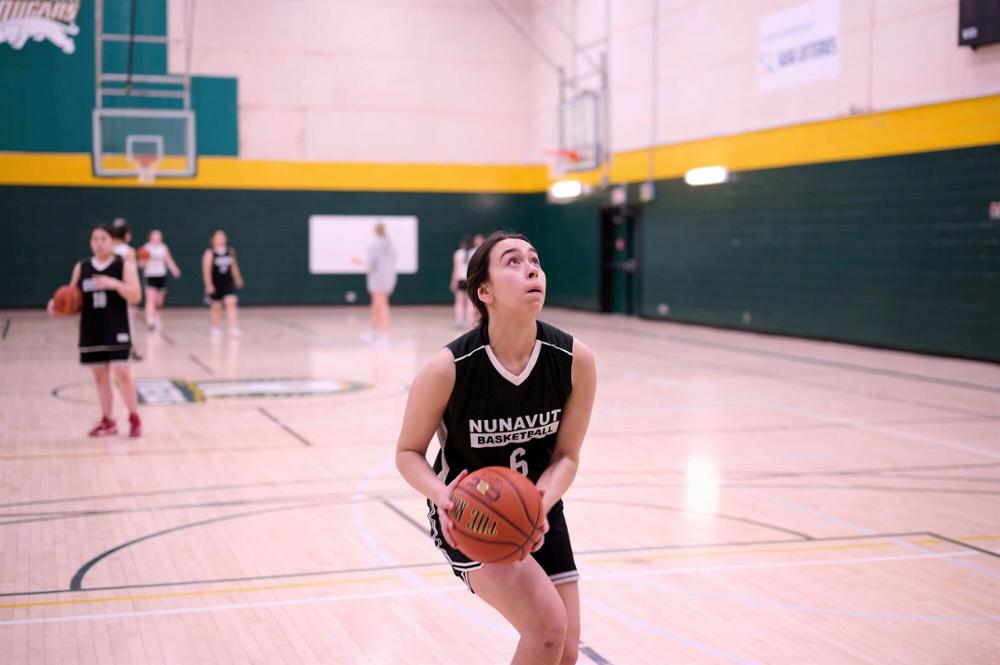
Team Nunavut spent the week with the Cougars, watching them play and training alongside them, but this time around it was what the U of R Cougars taught Team Nunavut off the court that made the greatest impact.
“They teach more than skills,” says Haley Hachey, a player on Team Nunavut. “They’ve been teaching us how to be good leaders, how to support one another, how to communicate.”
Team Nunavut Head Coach Olivia Tapatai appreciates the generosity of the Cougars that has made this experience easier for the students. “The U of R cougars are so giving. Cara, Ryenn, and Jade gave all the time they had to us. They were with us every second they could when they weren't in class or their own practices. We can't say enough how helpful and kind they’ve been,” says Tapatai.
It’s clear the Cougars understand the power of sports on and off the court.
“I have realized that basketball is far more than just a game,” says Misskey. “Basketball brings people together, it brings joy and love, and it has the ability to empower and uplift anyone who is willing to put in the work.”
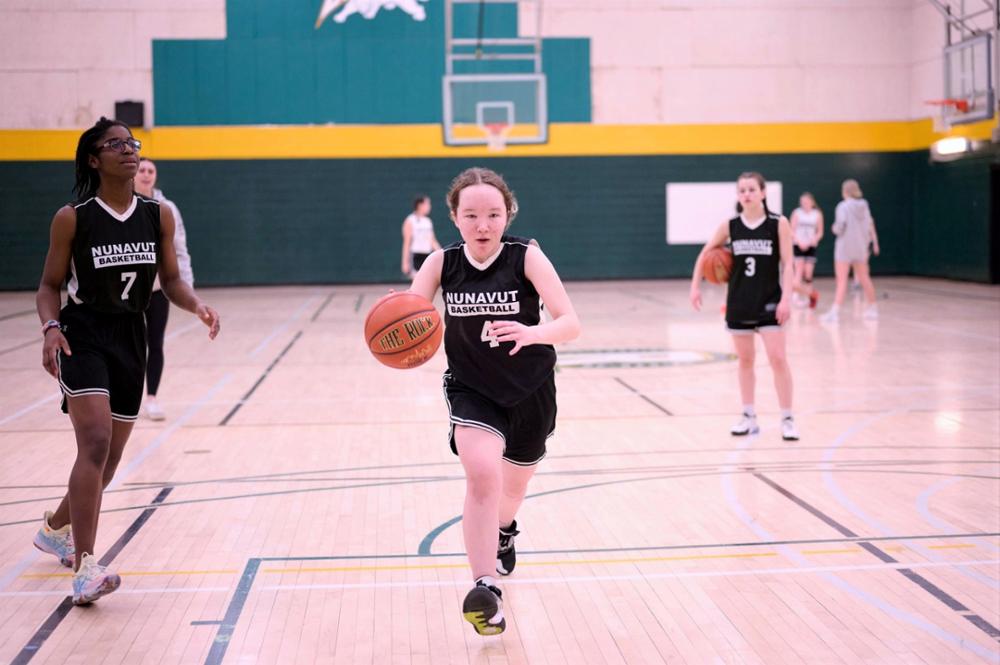
Passion to play
It's easy to take for granted how accessible sports are in many parts of Saskatchewan when there are so many opportunities available for students. However, in Nunavut, the vast distances between towns make organizing a team more difficult. Despite this, the students on Team Nunavut are all in and eager to play. Assistant Coach Megan Hachey says, “Everyone wants to be here. There is so much passion.”
Team Nunavut's enthusiasm goes deeper than just winning the game. As Misskey explains, "They are playing for their homes, communities, and culture". On the girl's team, 10 out of 12 players are Inuit, and they are proud to be playing in the Arctic Winter Games where they have the opportunity to represent themselves to the larger communities competing.
Misskey and her Cougar teammates have no doubt the kids will give it their all at the Mat-Su 2024 Arctic Winter Games, and she cannot wait to hear about their experience when she sees them again this spring.
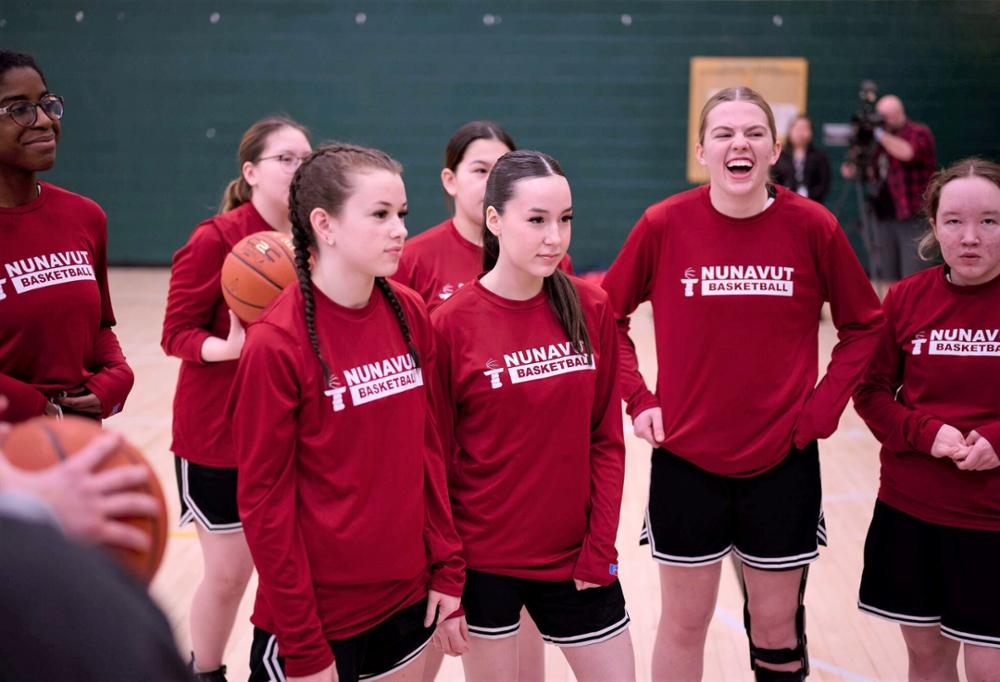
In May, Misskey, Belmore, and Schutz will return to Nunavut to hold more basketball clinics for the students, strengthening the bonds between the U of R and the Nunavut Basketball Association.
If you prefer learning by doing, you can gain valuable experience through both paid and volunteer positions. Graduate career-ready and find work fast. Visit U of R’s Centre for Experiential and Service Learning today!
About the University of Regina
2024 marks our 50th anniversary as an independent University (although our roots as Regina College date back more than a century!). As we celebrate our past, we work towards a future that is as limitless as the prairie horizon. We support the health and well-being of our 16,700 students and provide them with hands-on learning opportunities to develop career-ready graduates. Our research enterprise has grown to include 21 research centres and 12 Canada Research Chairs and brings in more than $51.2 million in funding annually. Our campuses are on Treaties 4 and 6 - the territories of the nêhiyawak, Anihšināpēk, Dakota, Lakota, and Nakoda peoples, and the homeland of the Michif/Métis nation. We seek to grow our relationships with Indigenous communities to build a more inclusive future.
Let’s go far, together.
